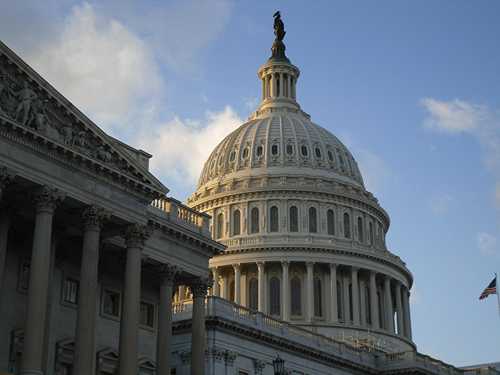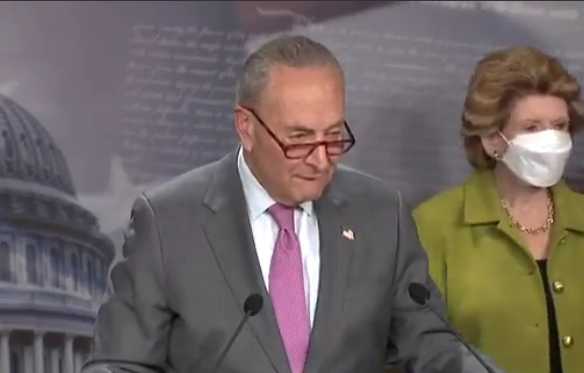“When members have access to classified information, we should not be trading in the stock market on it,” said Rep. Alexandria Ocasio-Cortez. “It’s really that simple.”

Four members of the U.S. House of Representatives from across the political spectrum came together on Tuesday to introduce the Bipartisan Restoring Faith in Government Act, which would ban federal lawmakers and their immediate relatives from owning and trading stocks.
Momentum for such a ban has been growing in the wake of various investigations last year, but Democrats—who controlled both chambers of Congress in 2022, but now only have a slim majority in the Senate—failed to pass any of the related legislative proposals, despite their popularity among voters.
“The fact that members of the Progressive Caucus, the Freedom Caucus, and the Bipartisan Problem Solvers Caucus, reflecting the entirety of the political spectrum, can find common ground on key issues like this should send a powerful message to America,” said Congressman Brian Fitzpatrick (D-Pa.), who is leading the new bill with Reps. Matt Gaetz (R-Fla.), Raja Krishnamoorthi (D-Ill.), and Alexandria Ocasio-Cortez (D-N.Y.).
“We all view this as a critical first step to return the House of Representatives back to the people.”
“We must move forward on issues that unite us, including our firm belief that trust in government must be restored, and that members of Congress, including their dependents, must be prohibited from trading in stocks while they are serving in Congress and have access to sensitive, inside information,” Fitzpatrick continued. “This is basic common sense and basic Integrity 101. And we all view this as a critical first step to return the House of Representatives back to the people.”
As Trevor Potter, president of the Campaign Legal Center and former chair of the Federal Election Commission, explained last September, “Congress passed the Stop Trading on Congressional Knowledge (STOCK) Act into law 10 years ago, but the STOCK Act did not decrease the appearance of corruption that arises when members of Congress engage in suspicious stock trades.”
If passed, the new restrictions proposed by Fitzpatrick’s diverse group would apply to all members of Congress as well as their spouses and dependents.
“The ability to individually trade stock erodes the public’s trust in government,” asserted Ocasio-Cortez. “When members have access to classified information, we should not be trading in the stock market on it. It’s really that simple.”
While the progressive “Squad” member has often clashed with Gaetz, their comments Tuesday made clear they agree on this topic.
“Members of Congress are spending their time trading futures instead of securing the future of our fellow Americans. We cannot allow the Swamp to prioritize investing in stocks over investing in our country,” said Gaetz. “As long as concerns about insider trading hang over the legislative process, Congress will never regain the trust of the American people. Our responsibility in Congress is to serve the people, not hedge bets on the stock market.”
Krishnamoorthi also agreed that “members of Congress must be focused on their constituents, not their stock portfolios.”
The Hill on Tuesday highlighted some recent events that have fueled bipartisan support for a stock trading ban:
In 2022, then-Speaker Nancy Pelosi’s (D-Calif.) husband sold millions of dollars worth of shares of a computer chip maker as the House prepared to vote on a bill focused on domestic chip manufacturing. A spokesman for Pelosi said at the time that he sold the shares at a loss.
Former Sen. Richard Burr (R-N.C.), who at the time was chairman of the Senate Intelligence Committee, also unloaded stocks at the onset of the coronavirus pandemic. The Securities and Exchange Commission recently closed a probe of his trading activities without taking action.
The legislation unveiled Tuesday is supported by advocacy groups including the watchdog Citizens for Responsibility and Ethics in Washington (CREW).
“When members of Congress own and trade stock in companies they regulate they undermine the democracy that they were elected to serve,” argued CREW policy director Debra Perlin. “It is Congress’ duty to rebuild the trust that it has lost by banning members of Congress, their spouses, and their dependent children from owning or trading stocks. And that is precisely what the Bipartisan Restoring Faith in Government Act does.”
The proposed “complete prohibition on congressional stock ownership demonstrates that in our democracy the public’s needs, rather than members’ stock portfolios, come first,” Perlin added. “CREW commends Rep. Fitzpatrick for his work on this issue and strongly encourages Congress to pass stock ban legislation as quickly as possible.”
Emma Lydon, managing director of P Street, the government affairs sister organization of the Progressive Change Campaign Committee, similarly called on the House—which is now narrowly controlled by Republicans—to “take swift action to pass this critical, bipartisan anti-corruption legislation to restore public trust in our democracy.”
“Elected officials should represent the interests of their constituents, not their own pocketbooks,” declared Lydon. “It’s a scandal that members of Congress are still allowed to own and trade individual stocks while casting votes that move markets and transform economic sectors.”





